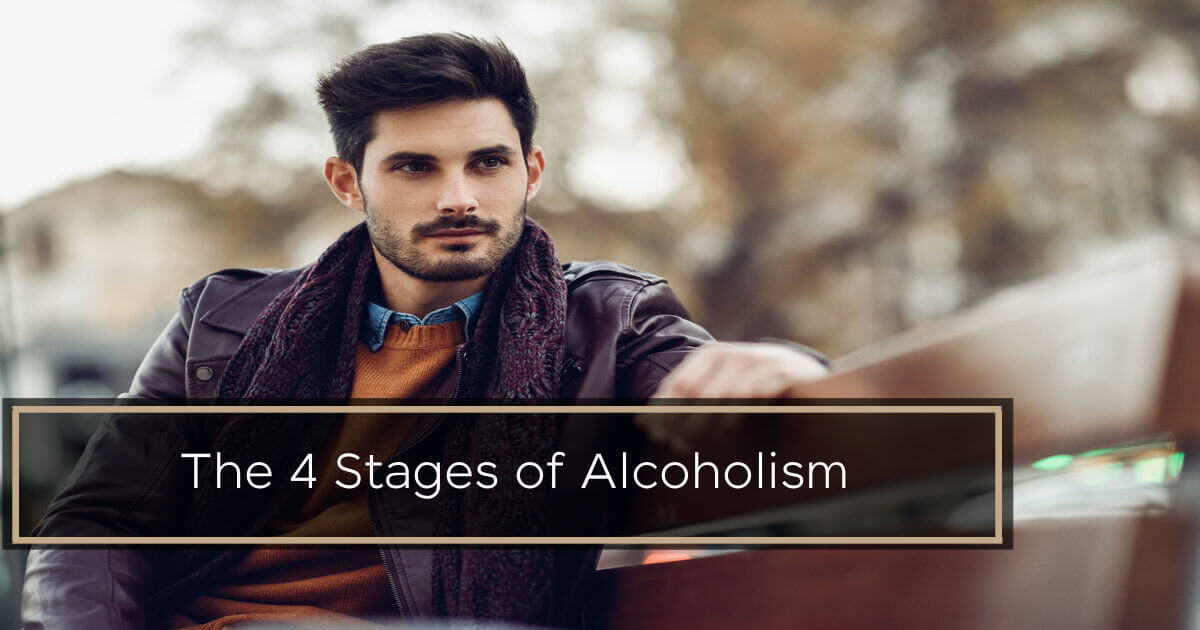One of the reasons why many people fail to get alcohol addiction treatment is that they fail to recognize the fact that they have a drinking problem. Alcoholism is a progressive disease that worsens over time, so the signs of alcohol addiction come on slowly. This can make it hard for people who abuse alcohol and their loved ones to tell when recreational or binge drinking has developed into alcohol addiction. Understanding the stages of alcoholism can help you decide if you or a loved one needs help with heavy drinking or alcohol dependence.
What Is Alcohol Use Disorder?
Alcohol use disorder is another term for alcoholism. It is when a person has an emotional and physical dependence on alcohol that leads to their craving of alcohol. If someone who has chronic alcoholism tries to just stop drinking, they may experience alcohol withdrawal symptoms like anxiety, shaking hands, nausea, vomiting, sleep problems, confusion, and rapid heartbeat.
What Are the Four Stages of Alcoholism?
Although everyone experiences alcohol use disorder differently, the disease typically progresses through four stages: binge drinking, problem drinking, dependence and alcoholism. Let’s review each stage.
Binge Drinking
Binge drinking is when a person is drinking to escape. A person may consume a large amount of alcohol at one time to relax, feel social or to block out negative thoughts and feelings.
About one in four people who binge drink consume at least eight drinks during a drinking session. However, you can still binge drink even if you consume fewer drinks. Simply put, binge drinking is when you drink alcohol specifically for the purpose of becoming heavily intoxicated. Over time, people who binge drink typically develop alcohol tolerance, so it takes more drinks to get them to the level of intoxication that they seek.
Binge drinking can have serious short-term health effects, such as disorientation, severe vomiting, seizures, and alcohol poisoning. People who binge drink are at an increased risk of becoming victims of violence, contracting sexually transmitted infections, and developing chronic conditions like high blood pressure, cancers, and liver disease.
Problem Drinking
Problem drinking is the second stage and is generally described as drinking to cope. People may turn to alcohol because they feel stressed, are dealing with trauma or are struggling with their mental health. While binge drinking usually occurs in social settings, problem drinking may occur at home. Individuals engaging in problem drinking may also socialize specifically so that they have an excuse to drink alcohol.
At this stage of alcohol abuse, a person begins to become emotionally dependent on alcohol, using it to deal with or drown out unpleasant or negative thoughts, feelings, and emotions. When they don’t drink, they may experience feelings of depression or anxiety. Also, their daily activities may be hampered by frequent hangovers.
Dependence
The third stage of alcohol use disorder is dependence, when someone is drinking to feel normal. Over time, abusing alcohol leads to changes in the brain. When this occurs, going without alcohol can cause a person to experience withdrawal, so they continue to drink to avoid unpleasant physical symptoms. In some cases, people with alcohol dependence may be drinking throughout the day but still seem sober.
End-Stage Alcoholism
If alcohol use disorder progresses to end-stage alcoholism, a person drinks to survive. The physical dependence has gotten to the point that stopping drinking could lead to life-threatening withdrawal symptoms. People with end-stage alcoholism are highly at risk for developing hepatitis, heart failure, cirrhosis of the liver, pancreatitis, and frequent respiratory infections.
How to Determine if You or a Loved One May Need Help
At any stage, treatment for alcohol addiction can help a person stop drinking safely, explore their reasons for alcohol abuse, get help for underlying mental health conditions and learn strategies and coping mechanisms to help them avoid alcohol in the future.
Some signs that you or your loved one may need help include:
- Frequent binge drinking
- Needing more and more alcohol to get drunk or to feel normal
- Experiencing withdrawal symptoms when not consuming alcohol
- Being unable to stop or cut back on drinking
- Spending too many days recovering from hangovers
- Drinking alone
- Trying to hide drinking habits
- Putting drinking before relationships and responsibilities
- Becoming angry when questioned about drinking
- Avoiding social gatherings that don’t involve alcohol
- Frequent drinking to the point of blackout
- Making excuses for drinking at inappropriate times
Recovery from alcohol use disorder begins with seeking help. Counselors at The Dunes East Hampton are waiting to talk to you and get you or your loved one on the path to recovery. Contact us today to learn more about treatment options.
References:
https://americanaddictioncenters.org/alcoholism-treatment/stages
https://theduneseasthampton.com/addiction-resources/four-stages-of-alcoholism/
https://www.cdc.gov/alcohol/fact-sheets/binge-drinking.htm
https://www.niaaa.nih.gov/publications/brochures-and-fact-sheets/understanding-alcohol-use-disorder
https://www.soberlink.com/addiction-recovery-blog/understand-different-stages-alcoholism
https://www.webmd.com/mental-health/addiction/alcohol-withdrawal-symptoms-treatments#1








